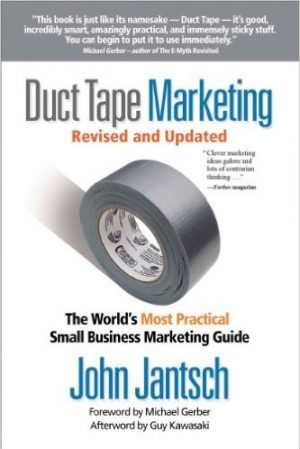Duct Tape Marketing

It’s hard to think of something that’s more practical than duct tape. Whether you’re a fan of the TV show MythBusters or you’ve got your own stories about what you’ve been able to do with duct tape, you know it’s pretty amazing stuff. Duct Tape Marketing promises to help you put together marketing with a limited budget – as other books like Guerilla Marketing do. I stumbled across the book from a friend of mine having forwarded a seminar – that I couldn’t attend but I decided to invest in the book anyway.
The book clarifies some difficult concepts. Having watched the corporate search and workflow markets grow up over the past several years, I’m intimately aware of how difficult it is to build a market. Building a market takes time, patience, education, and luck. Duct Tape marketing makes it clear that it’s easier to differentiate your offerings in a competitive market than it is to create a market. This truth applies to every marketing situation whether it’s SharePoint or Comedy. I know that the biggest challenge I have in helping people understand the power of the Shepherd’s Guide is that I’ve got a model they’ve never seen before – licensing content for use on their network. Creating that little sub-market inside of the SharePoint space has proved to be more challenging (and rewarding) than I could have imagined.
There are some pretty classical messages in the book like finding your unique market proposition (what makes you uniquely valuable), finding your ideal client (creating a picture of the perfect client so you can always keep them in mind as you’re seeking clients), and an elevator pitch (a 30 second verbal commercial you give to folks when they ask you what you do.) – just to name a few. If you’re looking for some fundamentals of marketing you’ll find that the coverage is there.
In addition to the classic content, you’ll find some fairly progressive thinking in Duct Tape Marketing too. There is practical advice on how to create content and pointers to some services that can help you in your content creation journey. Fundamentally John Jantsch believes that the key to success is the creation of content. This shouldn’t be too surprising from a book author, however, the conversation is very pragmatic. I loved his coverage of objections – “No one reads blogs” with the honest truth – search engines love blogs and if you’ve searched for any topic on the Internet it’s likely you’ve seen blogs in the results.
In the end, Duct Tape Marketing is a nice balance between theory, approach, and practice. If you’re looking to step up your marketing game, it’s worth a read.
